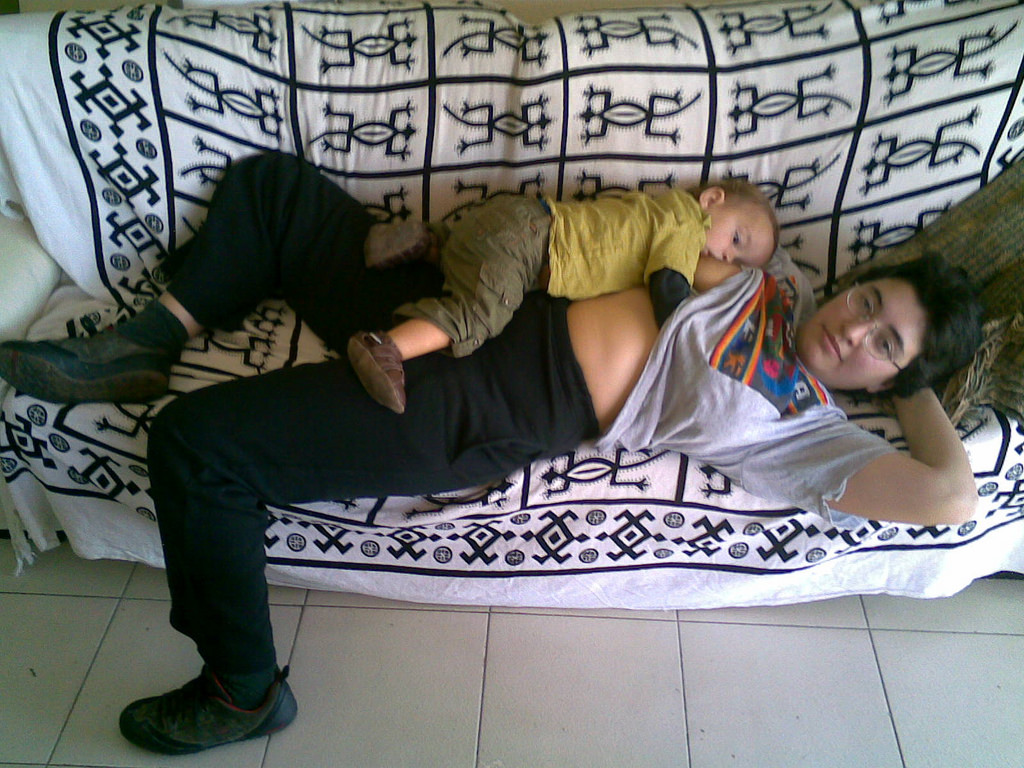 The benefits of breastfeeding range from improved IQ to fewer behavior problems to reduced asthma risk. A new study has found another possible benefit of breastfeeding in the physical structure of our DNA.
The benefits of breastfeeding range from improved IQ to fewer behavior problems to reduced asthma risk. A new study has found another possible benefit of breastfeeding in the physical structure of our DNA.
Photo credit: babasteve via Foter.com / CC BY-NC
What is DNA?
DNA stands for deoxyribonucleic acid. It is mostly stored in the nucleus of our cells.((https://ghr.nlm.nih.gov/primer/basics/dna))
DNA has been called the “blueprint” of life. There is a common misbelief that DNA is entirely hereditary; however, through epigenetics the old debate of nature versus nurture becomes relevant.
Live Science explains:
Epigenetic changes are biological markers on DNA that modify gene expression without altering the underlying sequence. Researchers have found that environmental factors — such as trauma, stress and even diet — can activate epigenetic changes.
Although genes are mostly hardwired at the moment an egg is fertilized by a sperm, epigenetics suggests that DNA may be more susceptible to change than was previously thought.
Even your grandparents’ environment has altered your hereditary genes leaving “scars”.((http://www.livescience.com/37135-dna-epigenetics-disease-research.html))
Breastfeeding and DNA
New research has found another possible benefit of breastfeeding: creating longer telomeres on our chromosomes. According to the New York Times:
The new study, published in The American Journal of Clinical Nutrition, is a hopeful one, its authors say, because it suggests telomere length in early life may be malleable. The researchers, who have been following a group of children since birth, measured the telomeres of 4- and 5-year-olds, and discovered that children who consumed only breast milk for the first four to six weeks of life had significantly longer telomeres than those who were given formula, juices, teas or sugar water.
What is a telomere?
The University of Texas explains:
A telomere is a repeating DNA sequence (for example, TTAGGG) at the end of the body’s chromosomes. The telomere can reach a length of 15,000 base pairs. Telomeres function by preventing chromosomes from losing base pair sequences at their ends. They also stop chromosomes from fusing to each other. However, each time a cell divides, some of the telomere is lost (usually 25-200 base pairs per division). When the telomere becomes too short, the chromosome reaches a “critical length” and can no longer replicate. This means that a cell becomes “old” and dies by a process called apoptosis. ((http://www.utsouthwestern.edu/labs/shay-wright/research/facts-about-telomeres-telomerase.html))
Telomeres are the protective caps at the end of our chromosomes. They have been compared to the little plastic end caps on shoelaces in their role of protection. ((https://med.stanford.edu/news/all-news/2015/01/telomere-extension-turns-back-aging-clock-in-cultured-cells.html))
The shortening or loss of a telomere has a drastic effect on our health and longevity.
Shorter telomeres have been linked to disease and “poor survival”. They play a vital role in gene health. Telomeres are the “biological clocks” in our bodies. ((http://www.ncbi.nlm.nih.gov/pmc/articles/PMC3370421/))
Diet plays an important role in telomere health. It seems logical that breastmilk could be positively associated with telomere length.

Photo credit: Mothering Touch via Foter.com / CC BY
Although the new study is not thorough enough to be conclusive, the results may explain all of the other benefits of breastfeeding routed in breastmilk’s affect telomere length. From obesity prevention to allergies, the benefits could all be traced back to telomeres. The New York Times continues:
When the children were 4 and 5 years old, researchers took blood spot samples that could be used to measure the telomeres in leukocytes, which are white blood cells, from 121 children. They found that children who were being exclusively breast-fed at 4 to 6 weeks of age had telomeres that were about 5 percent longer, or approximately 350 base pairs longer, than children who were not…
“What’s remarkable about breast-feeding is its ability to improve health across organ systems,” Dr. Wojcicki said. “Telomere biology is so central to the processes of aging, human health and disease, and may be the link to how breast-feeding impacts human health on so many levels.”
There are several possible explanations for the correlation between breast-feeding and longer telomeres. Breast milk contains anti-inflammatory compounds, which may confer a protective effect on telomeres. It’s also possible that parents who exclusively breast-feed their babies are more scrupulous about a healthy diet generally.((http://well.blogs.nytimes.com/2016/08/04/breast-fed-babies-may-have-longer-telomeres-tied-to-longevity/?em_pos=medium&emc=edit_hh_20160805&nl=well&nl_art=7&nlid=48748113&ref=headline&te=1&_r=0))

Photo credit: rabble via Foter.com / CC BY-SA
Interestingly, it is not only diet that can affect telomere length but attachment and bonding can as well. Researchers suspect this is another benefit of breastfeeding on telomere length, as previous research has found shortened telomeres in orphans who lacked strong bonds with caregivers.
When children are exposed to adversity, neglect or violence at an early age, “psychological stress creates a biochemical environment of elevated free radicals, inflammation and stress hormones that can be harmful to telomeres,” said Elissa Epel, one of the authors of the study who is a professor at the University of California, San Francisco, and director of the Aging, Metabolism and Emotions Lab.((http://well.blogs.nytimes.com/2016/08/04/breast-fed-babies-may-have-longer-telomeres-tied-to-longevity/?em_pos=medium&emc=edit_hh_20160805&nl=well&nl_art=7&nlid=48748113&ref=headline&te=1&_r=0))
Researchers have found that stress negatively affects telomere length, no matter our age.((http://www.ncbi.nlm.nih.gov/pmc/articles/PMC3370421/))
Could your ancestors’ history of breastfeeding affect your telomeres? It’s possible. Live Science reports:
Jirtle has conducted research on mice to examine how the epigenome is affected by changes in nutrition. In one study, Jirtle found that mice whose mothers were fed food with fewer vitamins were more susceptible to obesity and other diseases, suggesting nutrition changes may have generational impacts.((http://www.livescience.com/37135-dna-epigenetics-disease-research.html))
Often when mothers who were unable or chose not to breastfeed read about the benefits, they feel guilty or defensive. This post is not written to make anyone feel that way. We believe breastmilk is best for babies, but we understand and do not judge mothers.
Leave a Reply